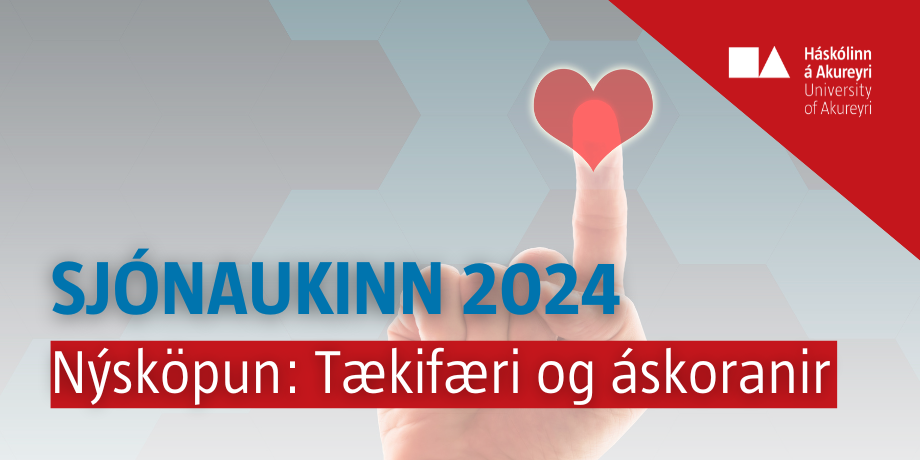- Study
- Student
- Research
- About UNAK
- University
- Schools & faculties
- Governance
- Rector
- Rector’s Office
- University Council
- University Assembly
- University Office
- Laws and regulations
- Organization
- Code of Ethics
- Councils and committees
- Strategies & policies
- On campus
- Human resource
Sjónaukinn 2024
15.-16. May
The annual conference of the School of Health, Business and Natural Sciences
Register Today - we look forward to having an informative and nourishing time together!
The annual conference of the School of Health, Business and Natural Sciences, University of Akureyri, focusing on health sciences, will be held at the University of Akureyri and online on May 15th - 16th 2024. The theme of the conference this year is Innovation: Opportunities and Challenges.
Keynote Speakers
Kjartan Sigurðsson
Assistant Professor at the University of Akureyri
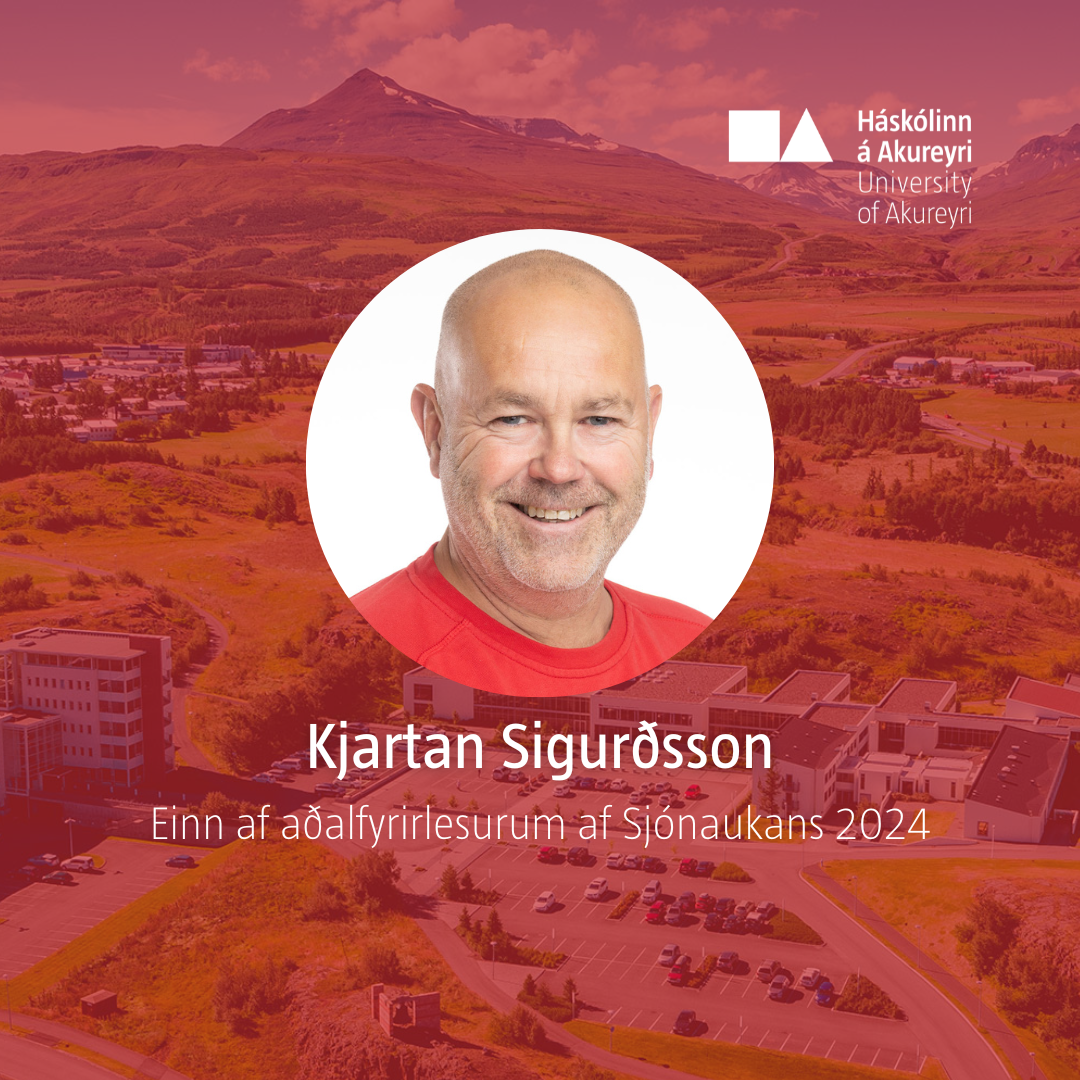
Dr. Kjartan Sigurdsson fronts the work on innovation and entrepreneurship at UNAK, combining his academic knowledge with real-world experience. As an assistant professor with deep expertise in sustainable business strategies, innovation, and entrepreneurship, he contributes to modern business through teaching and consulting. Known for delivering practical advice, he fosters responsible business development and has significantly influenced the growth of companies throughout Europe and Iceland. His success in translating academic research into business progress and guidance on innovative and sustainable practices have firmly established his reputation for driving industry growth.
What is innovation – How do we handle it at the University of Akureyri?
Innovation transforms novel ideas into practical solutions, crucial for driving progress and addressing emerging challenges in society and industry. In this presentation, I explore the role of innovation at the University of Akureyri and how it serves as a pivotal catalyst for regional and academic development. I will delve into the newly initiated project Entrepreneurship and Innovation, designed to infuse an entrepreneurial spirit throughout the university’s community, engaging staff and students in innovative endeavours. This project is not merely an educational initiative but a broader commitment to fostering sustainable economic growth and enhancing the university’s role as a bridge between academia, local industries, and society. The focus will be on the strategic development of this bridge—a venture previously unexplored in North Iceland—which aims to facilitate seamless interactions and partnerships between the university and external stakeholders. By leading these efforts, the university supports the development of new business initiatives and positions itself among leaders in driving entrepreneurial ventures and industrial collaboration. The outcomes of these efforts could significantly impact economic vitality and provide a model for enhancing competitiveness and fostering societal prosperity through continuous innovation and entrepreneurial activities. The University of Akureyri aims to be recognized as innovative and a key player in nurturing a vibrant entrepreneurial ecosystem in rural Iceland.
Guðmundur Fertram Sigurjónsson
Founder and CEO of Kerecis
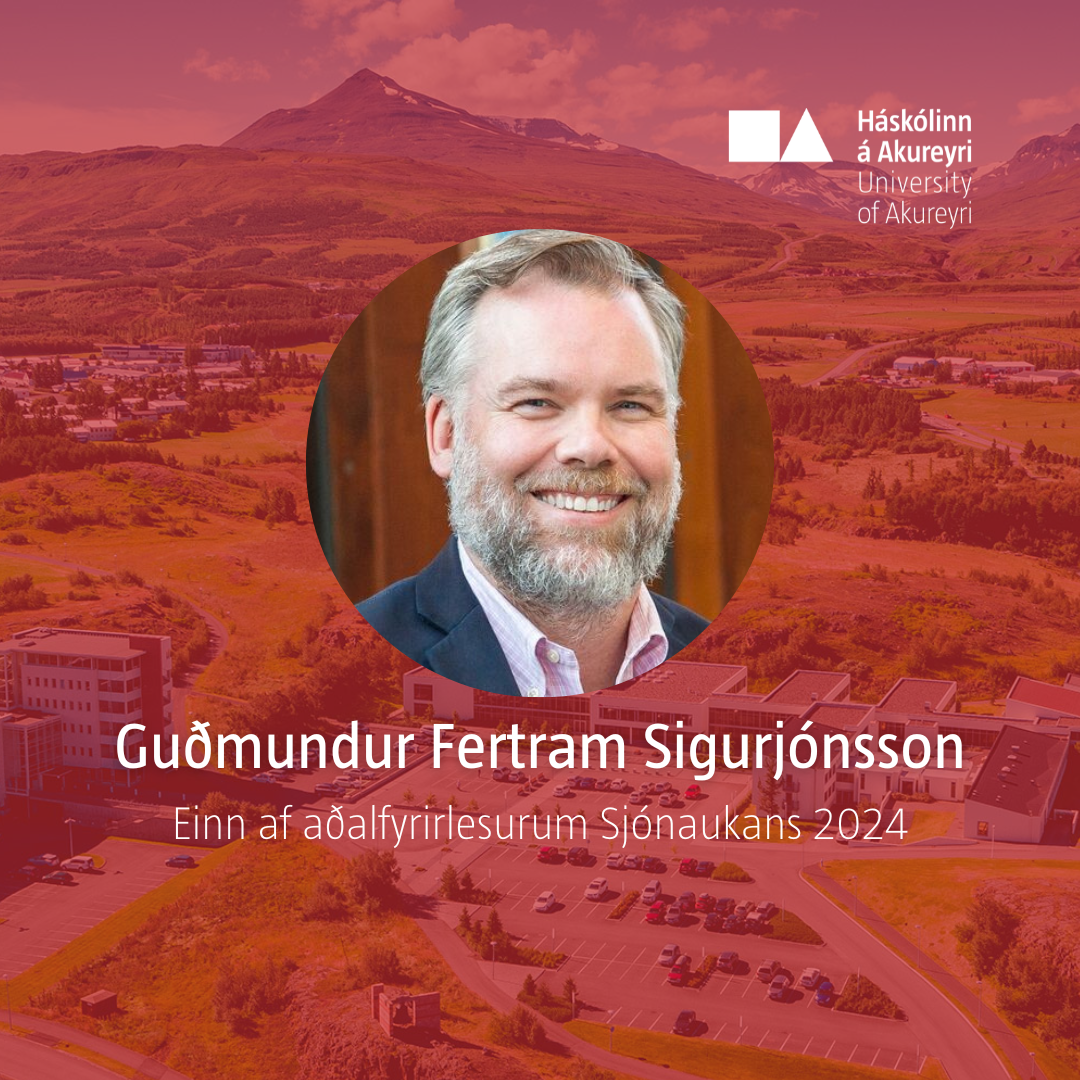
Fertram Sigurjonsson is the CEO and founder of Kerecis, an Icelandic biotechnology company specializing in developing, manufacturing, and distributing medical products crafted from cod skin. Renowned as a serial entrepreneur, Fertram has spearheaded domestic and international ventures, spanning software engineering, financial technology, and the energy, biotechnology, and healthcare sectors. His prolific innovation is underscored by a portfolio boasting hundreds of patents and applications.
Beyond his executive role at Kerecis, Fertram has contributed his expertise to numerous corporate and advisory boards. He holds positions of influence within esteemed organizations such as The Icelandic Science and Technology Council, the Icelandic Chamber of Commerce, and the Association of Icelandic Life- and Healthtec Companies.
Fertram's entrepreneurial prowess has earned him widespread recognition and prestigious awards. He was honored with the Entrepreneur of the Year award from Ernst & Young in the United States in 2021, a testament to his outstanding contributions. The President of Iceland has also celebrated his achievements, honoring him with the Icelandic Innovation and Entrepreneurship Award on multiple occasions. Under Fertram's leadership, Kerecis has achieved notable milestones, earning distinctions such as the Growth Spurt of the Year award twice. The company's exceptional trajectory culminated in its acquisition by Coloplast for 1.2 billion dollars, propelling it to the status of Iceland's first Unicorn company and earning Fertram the title of Business Person of the Year 2023 in Iceland. Recognized for his groundbreaking contributions to healthcare, Fertram was named Inventor of the Year 2024 by the European Wound Management Association.
Outside the boardroom, Fertram's academic background in chemistry and engineering informs his commitment to environmental stewardship. He is devoted to his family, sharing his life with his wife, Fanneyja Hermannsdóttir, and their five children. His personal and professional passions converge in his advocacy for preserving oceanic ecosystems, reflected in Kerecis's dedication to sourcing sustainable resources for its products.
Bergljót Borg og Ósk Sigurðardóttir
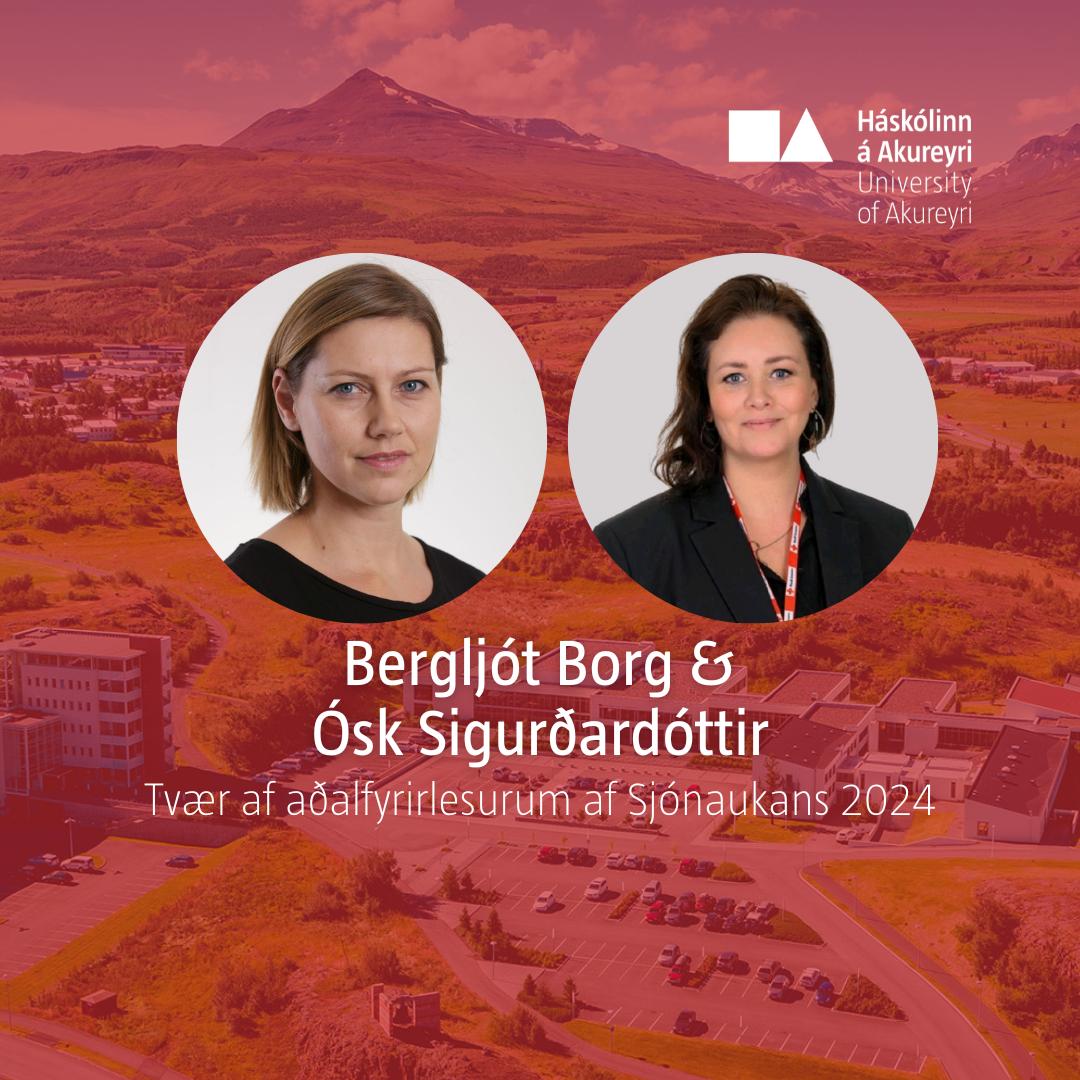
Bergljót works as the manager of SLF, a non-profit organization which runs rehabilitation services and summer camps for children with special support needs. She also works part-time as an adjunct at the Faculty of Occupational Therapy at the University of Akureyri and leads the innovation study team. Her educational backround and professional experience is in the field of Physical Therapy and she also holds a MPM degree and MS in Health Science.
Ósk works as Director of Capital Branch, Icelandic Red Cross. She has worked across many different organisational forms and has taken on the role of activist leader alongside the commercial and public sector. She's an adaptive leader with the ability to effect change across a range of environments from hospitals to start-ups, federations to associations. She has a broad educational background; OT R/L, with MPM and MBA degree and holds a Post Graduate degree in Strategy & Innovation from the University of Oxford.
Summary of presentation:
In 2015, efforts began to revamp the curriculum in occupational therapy, aiming among other things to enhance students' skills for innovation. By spring 2020, the first group of students participated in an innovation course. Today, the fifth cohort is completing their final projects. In autumn 2020, master's students in health sciences also began to take shortened innovation course as part of their core curriculum.
The course for occupational therapy students is structured as an accelerator, requiring students to define challenges, assess markets, and conduct needs analysis. They then develop financial and marketing plans and create a minimum viable product (MVP). This process has been remarkably engaging. Initially skeptical, students now eagerly anticipate the course.
Innovation is not only the cornerstone of economic success but also key to addressing the major challenges of the coming decades. The aging population and rising lifestyle diseases pose significant challenges in the years ahead. Healthcare professionals must not only fulfill their daily duties but also engage in continuous improvements and innovation processes. They are at the forefront of these mega challenges, highlighting the importance of training healthcare students to tackle problems fearlessly with a tool box acquired in their studies.
It's crucial for us as a society not to narrowly define innovators. Innovation is not solely for those in business or technology. It's important for innovators to be as diverse as the end-users. Therefore, teaching innovation in health sciences is essential, both to engage those tackling society's greatest challenges daily and to involve a diverse range of individuals in the process.
Arna Sól Mánadóttir, Hrafnhildur Ósk Halldórsdóttir og Thelma Dögg Grétarsdóttir
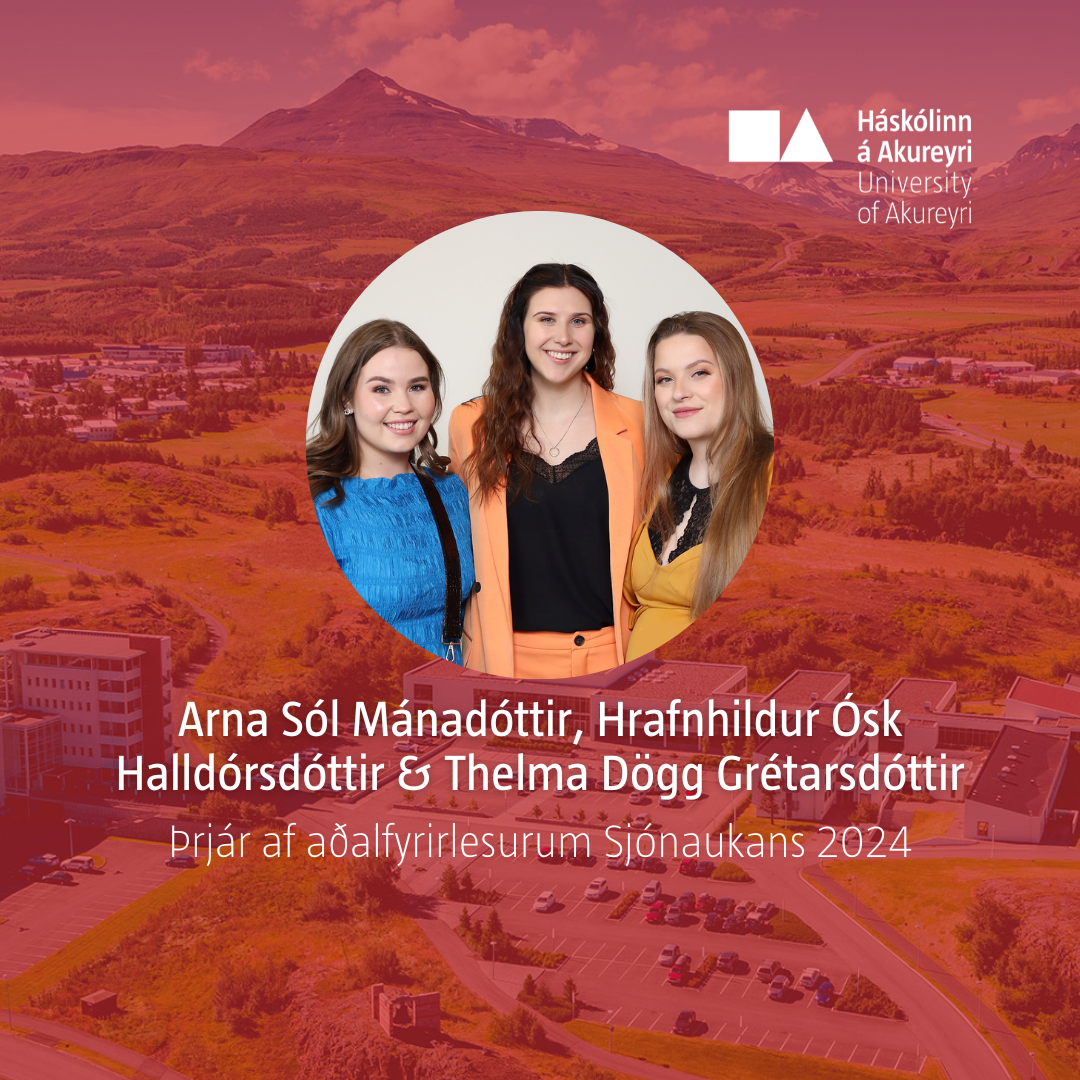
From Vision to Reality: The Journey of Entrepreneurship
We got inspired long before our formal course on entrepreneurship started. Our journey through the class was filled with unexpected challenges but at the same time we were eager to succeed. We recognized a critical need and devised a solution with the purpose of preventing hand-arm vibration syndrome specified to aluminium smelters. After graduation we took some break, but then got back together, taking the leap to step out of our comfort zone and dive into the real world. Despite being faced with setbacks, including a recent unsuccessful funding application, we have gotten interest from industry stakeholders. With a declaration of interest from an aluminium smelter, we believe in what we have made and will take on obstacles as they come, using them as a stepping stone towards what’s ahead. This is our journey, from vision to reality.
Gojiro Nakagami
Prof. Dr. at UTokyo
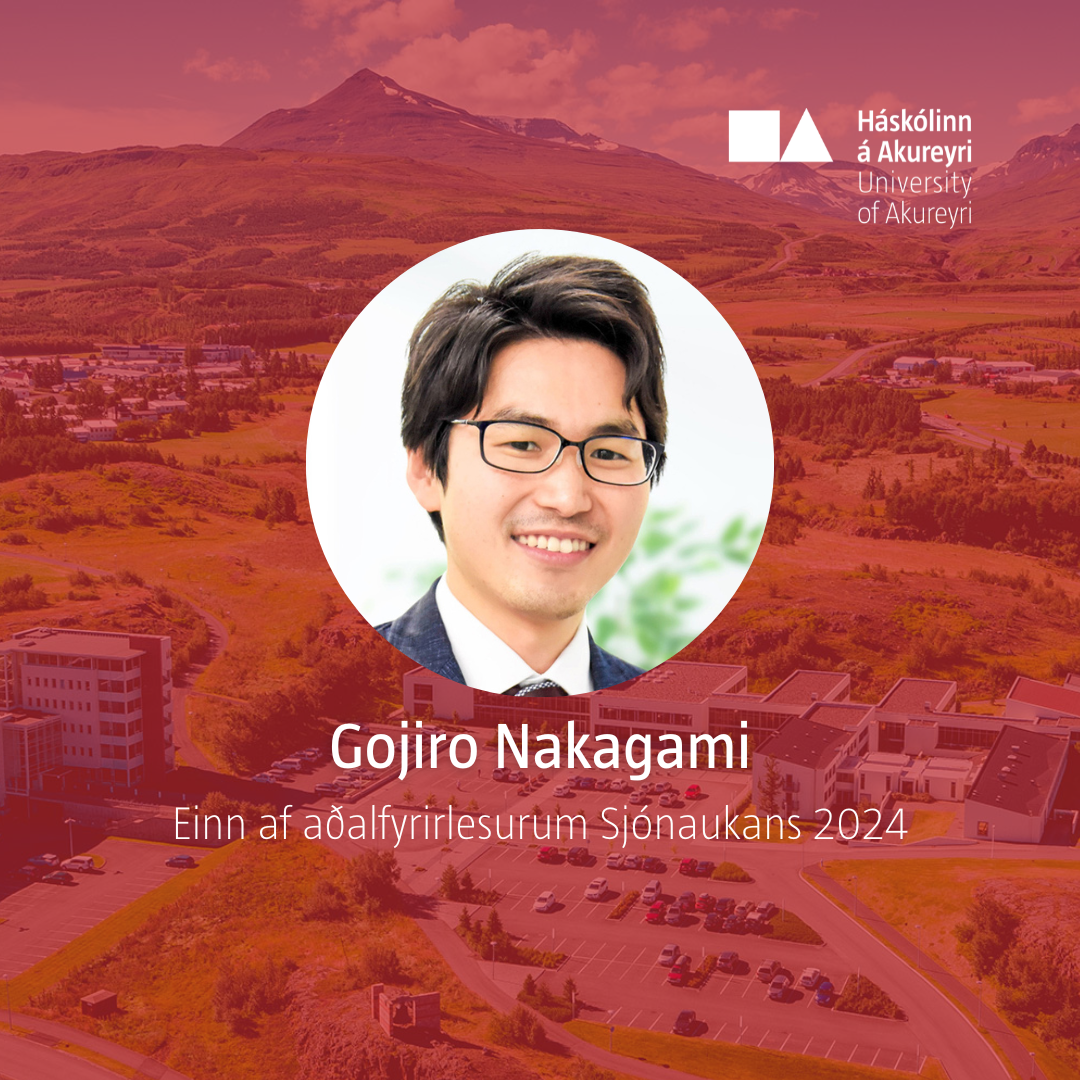
After studying Health Sciences at Kobe University School of Medicine and UTokyo and working as an Assistant Professor, Dr. Gojiro Nakagami was appointed as a Visiting Researcher at the University of California, Los Angeles in 2013. He returned to UTokyo as faculty in 2017.
Dr. Nakagami’s research topic is in nursing science and engineering with special focus on developing technologies for the alleviation of geriatric syndrome. He uses animal models to elucidate pathogenic mechanisms, identify novel biomarkers, and develop treatment methods for hard-to-heal wounds. His contributions on a rapid identification technique, a minimally invasive removal method of wound biofilms and a biofilm-based wound management system have been cited worldwide.
Dr. Nakagami has collaborated with the UTokyo Hospital for over 15 years where he has developed a highly accurate pressure injury prediction model based on artificial intelligence. He is an active member of many academic societies including the Japanese Geriatrics Society, the Japanese Society of Pressure Ulcers, the Japanese Society of Wound, Ostomy and Continence Management, the Japanese Society of Nursing Science and Engineering, and the Japanese Academy of Nursing Science where he serves as a board member. During his doctoral studies, he was appointed as Research Fellow of the Japan Society for the Promotion of Science (DC2).
Summary of Presentation:
Bio-engineering in nursing has gained attention in recent years as a novel research framework dedicated to fostering care innovations. The research process initiates with clarifying clinical needs, followed by elucidating their mechanisms, developing objective measurement methods, and creating intervention devices and systems, culminating in their evaluation in clinical settings. This approach allows us to offer tangible solutions to clinical challenges and generate a substantial social impact. This presentation will share advancements in wound technologies that target wound biofilms, based on the bio-engineering nursing research framework.
Wound biofilms significantly hinder the healing of pressure injuries, making the targeting of biofilms a crucial aspect of enhanced wound care. Effective care for biofilm-based wounds requires clinically feasible methods for both detecting and eradicating biofilm. Our approach to biofilm detection employs a wound blotting technique that effectively captures small molecules, such as polysaccharides—a primary component of biofilm—from the wound surface. These molecules are then stained with Alcian blue, allowing for the visualization of biofilms in just two minutes.
For biofilm removal, ultrasonic debridement offers a non-invasive solution. We use a low-frequency (<100 kHz) and low-intensity (<100 mW/cm²) ultrasound device, attached to a curette-type probe, effectively eliminating biofilm, guided by the stained areas on the blotted membrane.
This presentation will explore the development of the wound blotting method for biofilm detection and its clinical applications in enhancing wound healing. Through this approach, we aim to improve the treatment of pressure injuries by overcoming the critical barrier posed by biofilm.
Sigríður Halldórsdóttir
Professor at the Faculty of Graduate Studies in Health Sciences
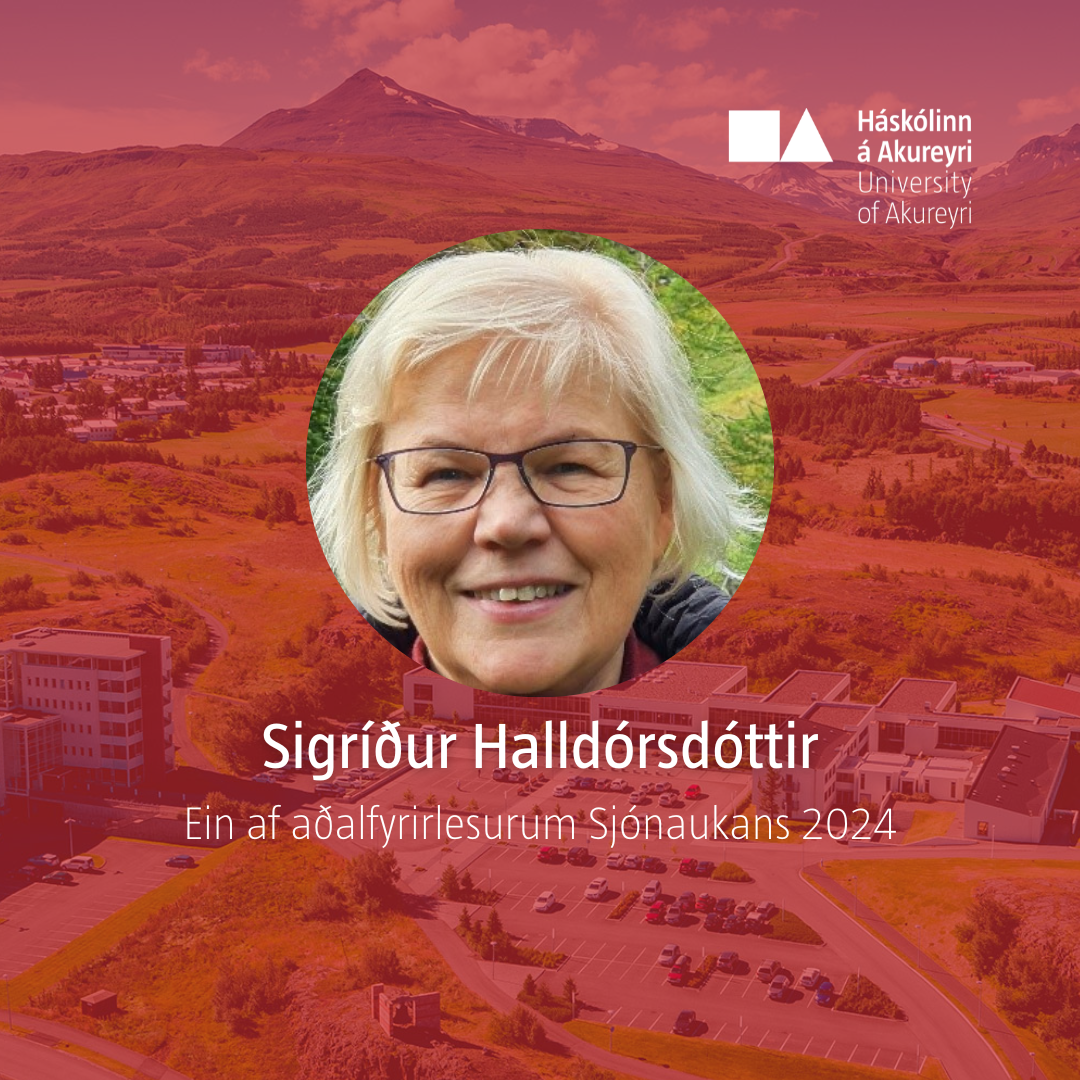
Sigríður Halldórsdóttir Ph.D. (Med. Dr.) completed her master's degree from the University of British Columbia in Canada in 1988 and her doctorate from the University of Linköping in Sweden in 1996. She has been a professor at the University of Akureyri since 1998 and has mainly taught research methodology. She has published research articles on various aspects of human life and three books on research methodology.
The title of Sigríðar presentation is "The Importance of Ethically Responsible Innovation".
As we venture into the realm of innovation, ethics should be at the forefront of our minds. But what exactly is ethical innovation, and why is it so significant? This lecture aims to answer these questions. When teaching students the importance of ethics in responsible innovation and the balance between ethics and visionary creativity, we should provide them with ethical knowledge and understanding. This includes educating them about the main theories of ethics and promoting their sense of practical ethics, code of conduct, and the main ethical principles such as responsibility, justice, autonomy, truth, and harmlessness. It is crucial to educate students about ethical principles and theories and to develop ethical self-awareness. Ethical sensitivity, perception, awareness, and judgment are not just important, they are crucial for responsible innovation. Innovators must possess ethical reasoning, reflection, decision-making, and responsible behavior, which involve honesty, fairness, responsibility, and professionalism. They must respect diversity and the rights of individuals and groups and promote mutual respect in all interactions. Ethical innovation is not an option but a necessity, and it's a necessity that cannot be ignored or delayed.
Hanna Sigríður Ásgeirsdóttir
Project Manager for Hátindur 60+
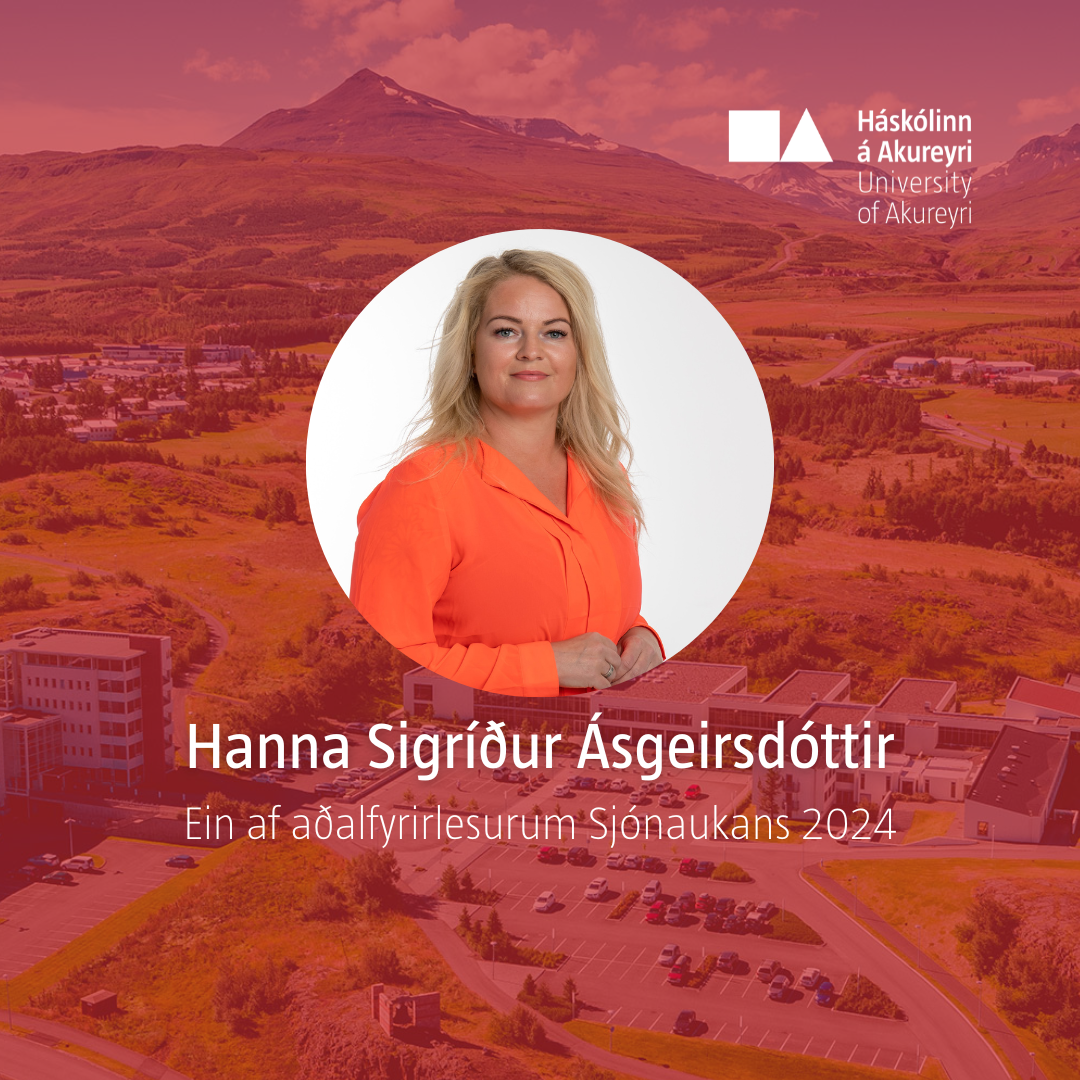
Hanna Sigridur Asgeirsdottir, project manager for Hatindur 60+in Fjallabyggd, has been in independent business for the past 12 years and holds a B.A. degree in Social Sciences from Bifröst University.
The project Hatindur 60+ in Fjallabyggð
Innovation and Development Project in Fjallabyggð Providing Services for Elderly Residents. Enhancing Trust and Security in intergrated healthcare and care and implementation off inovation in welfare technology.
The project in Fjallabyggd focuses on enhancing services for elderly residents within the municipality, aiming to address their diverse needs effectively. Participating in a Nordic forum, Fjallabyggd has been recognized as a proactive contributor and is featured prominently in the report of the Nordic Welfare Centre titled "Integrated Healthcare & Care."
The aim is to create a modern, sustainable, and welfare-enhancing service for the residents of Fjallabyggd. Diverse projects will be undertaken under the agreements made with various professional bodies. Cross-sector collaboration between social and health services is fundamental to achieving synergistic effects of expertise in each field and thereby ensuring better service for the growing population. The system will be tailored to meet the needs of users, such as integrating services that contribute to enabling older individuals to live longer at home, ensuring both safety and social aspects. This will create more flexibility to utilize human resources, financial support, and infrastructure more efficiently.
Programme
Sjónaukinn takes place on Wednesday and Thursday, 15.-16. May and the program starts at 9 am on both days. Click on the days below to see the full schedule or to access the schedule as a pdf here.
WHEDNESDAY 15. MAY
Opening session KL. 9 - M101 & online
OPENING SESSION & KEYNOTE SPEAKERS
Chairperson: Sonja Stelly Gústafsdóttir, director of Sjónaukinn comittee
09:00 Dagskrárkynning Sonja Stelly Gústafsdóttir director of Sjónaukinn comittee
09:05 Setning Áslaug Arna Sigurbjörnsdóttir Háskóla-, iðnaðar- og nýsköpunarráðherra
09:15 Opnunarávarp Eyjólfur Guðmundsson rektor HA
KEYNOTE SPEAKERS
09:25 What is innovation – How do we handle it at University of Akureyri?
Dr. Kjartan Sigurðsson lektor og stjórnandi nýsköpunar- og frumkvöðlaseturs við HA
10:00 The project Hátindur 60+ in Fjallabyggð
Hanna Sigríður Ásgeirsdóttir verkefnastjóri Hátindur 60+
10:30 HLÉ (20 mínútur)
10:50 Inspiring innovation in healthcare at UNAK?
Bergljót Borg framkvæmdastjóri Styrktarfélags lamaðra og fatlaðra og aðjúnkt við HA og Ósk Sigurðardóttir deildarstjóri Rauða krossins á höfuðborgarsvæðinu og stundakennari við HA
11:20 Calarmis – Bringing Theory to Practice, Occupational Therapy Across Diverse Fields
Thelma Dögg Grétarsdóttir, Arna Sól Mánadóttir og Hrafnhildur Ósk Halldórsdóttir, BS í iðjuþjálfun
12:10 Kerecis: A Success story from Iceland
Guðmundur Fertram Sigurjónsson stofnandi og forstjóri Kerecis
12:40 HÁDEGISHLÉ (50 mínútur)
13:30 PANEL - INNOVATION: OPPORTUNITIES AND CHALLENGES
Stjórnandi: Kjartan Sigurðsson
Þátttakendur: Bergljót Borg, Eyjólfur Guðmundsson, Guðmundur Fertram Sigurjónsson, Hanna Sigríður Ásgeirsdóttir og Ósk Sigurðardóttir
14:10 HLÉ (20 mínútur)
SJÓNAUKINN A kl. 14:30 - M101 & ONLINE
HUGUR OG HEILSA
Chairperson: Sonja Stelly Gústafsdóttir, director of Sjónaukinn comittee
14:30 Reynsla kvenna á Íslandi af psilocybin í sjálfsvinnu
Thelma Lind Guðmundsdóttir, Sigrún Sigurðardóttir og Karen Birna Þorvaldsdóttir
14:50 Óvirkni í námi, vinnu eða starfsþjálfun og áhrif erfiðrar reynslu í æsku
Hrafnhildur Ragnarsdóttir og Elísabet Hjörleifsdóttir
15:10 Slökun og frí frá hugsunum sem valda vanlíðan - Reynsla af skapandi iðju sem íhlutun í geðheilsuteymi Reykjalundar
Steinunn B. Bjarnarson, Hafdís Skúladóttir og Björg S. Anna Þórðardóttir
15:30 HLÉ (15 mínútur)
LANGVINN VEIKINDI OG ENDURHÆFING
Chairperson: Sonja Stelly Gústafsdóttir, director of Sjónaukinn comittee
15:45 Byrði ákveðinna langvinnra sjúkdóma. Samanburður milli landa
Árún K. Sigurðardóttir og Sarah Cuschieri
16:05 Áhrif endurhæfingar á líkamlega virkni og áhættuþætti kransæðasjúkdóms
Jóhanna Katrín Kristjánsdóttir, Margrét Hrönn Svavarsdóttir og Eva C. Halapi
16:25 Bata appið: Betri bati
Þórdís Jónsdóttir
16:45 DAGSKRÁRLOK A
SJÓNAUKINN B kl. 14:30 - M102 & ONLINE
HEILSA ÍSLENDINGA (ICEPAIN RANNSÓKNIN)
Chairperson: Þorbjörg Jónsdóttir
14:30 Áhrif liðskiptaaðgerða í hné og mjöðm á heilsutengd lífsgæði, verki og truflandi áhrif verkja: ICEPAIN rannsóknin
Hafdís Skúladóttir, Þorbjörg Jónsdóttir, Guðmundur K. Óskarsson og Eva C. Halapi
14:50 Tíðni og styrkur verkja meðal kvenna á barneignaraldri á Íslandi
Sigfríður Inga Karlsdóttir, Þorbjörg Jónsdóttir, Hafdís Skúladóttir, Eva C. Halapi og Guðmundur K. Óskarsson
15:10 Sálræna áföll í æsku og heilsufarsvandi á fullorðinsárum
Vera Sif Rúnarsdóttir, Þorbjörg Jónsdóttir, Eva C. Halapi
15:30 HLÉ (15 mínútur)
VELFERÐARTÆKNI
Chairperson: Hafdís Skúladóttir
15:45 Velferðartækni nútímans
Helga Dagný Sigurjónsdóttir og Stefanía Fanney Björgvinsdóttir
16:05 Nám áfengis- og vímuefnaráðgjafa: Fyllerí eða fagmennska?
Kristbjörg Halla Magnúsdóttir
16:25 Verður fortíðin framtíðin sem við viljum ekki?
Anna Lára Steindal og Haraldur Agnes Civelek
16:45 DAGSKRÁRLOK B
THURSDAY 16. MAY
Opening session kl. 9 - M101 & ONLINE
OPENING SESSION & KEYNOTE SPEAKERS
Chairperson: Deniz Harputlu, meðlimur Sjónaukanefndarinnar
09:00 Dagskrárkynning Deniz Harputlu, meðlimur Sjónaukanefndarinnar
KEYNOTE SPEAKERS
09:05 Japan Experiences on Innovation: Advanced Wound Technologies
Dr. Gojiro Nakagami, prófessor, við UTokoy í Japan
09:40 The importance of ethically responsible innovation
Dr. Sigríður Halldórsdóttir, prófessor við framhaldsnámsdeild í heilbrigðisvísindum
10:15 HLÉ (25 mínútur)
10:40 PANEL – PERSONAL RESEARCH EXPERIENCES OF EXPERTS: WHAT WAS EASY AND WHAT WAS CHALLENGING?
Stjórnandi: Dr. Brynjar Karlsson, forseti Heilbrigðis-, viðskipta- og raunvísindasviðs
Þátttakendur: Gojiro Nakagami og Sigríður Halldórsdóttir
11:20 HLÉ (10 mínútur)
SJÓNAUKINN A kl. 11:30 – M101 & online
HEILSA Á ÓLÍKUM ÆVISKEIÐUM
Chairperson: Nanna Ýr Arnadóttir
11:30 Obstructive Sleep Apnea (OSA). Prevalence among 4-8 Years Old Children in the General Population and Connection with Overweight and Obesity
Laufey Hrólfsdóttir, Hannes Petersen, Gróa Björk Jóhannesdóttir, Ingibjörg Ingólfsdóttir og Sólveig Magnúsdóttir
11:50 „Hvað eru margir í þessu hjónabandi“ ? Saga eldri manns í öðru hjónabandi með konu sem glímir við heilabilun
Olga Ásrún Stefánsdóttir og Merrie Kaas,
12:10 Líkamleg hreyfing og þátttaka í skipulögðum íþróttum meðal íslenskra ungmenna frá 15 til 17 ára aldurs
Þuríður Helga Ingvarsdóttir, Nanna Ýr Arnardóttir, Vaka Röngvaldsdóttir, Rúna Sif Stefánsdóttir og Erlingur Jóhannsson
12:30 HÁDEGISHLÉ (60 mínútur)
VELFERÐARTÆKNI - ÞJÓNUSTA
Chairperson: Nanna Ýr Arnadóttir
13:30 Fjarþjónusta og endurhæfing í Ljósinu
Berglind Ásgeirsdóttir, Louisa Sif Mønster
13:50 Minamo: Innovating surfaces, transforming lives
Vivien Nagy, Amin Amani og Már Mársson
14:10 Þróun stafrænnar lausnar í sjálfsmeðferð langvinnra veikinda
Hrefna Óskarsdóttir, Marta Kristín Lárusdóttir og Anna Sigríður Islind
14:30 Spegil samteikning til að efla tengsl og auka velferð
Unnur Guðrún Óttarsdóttir
14:50 DAGSKRÁRLOK A
SJÓNAUKINN B kl. 11:30 – M102 & online
STJÓRNUN – LÍÐAN Í STARFI
Chairperson: Þorbjörg Jónsdóttir
11:30 Streita, kulnun og bjargráð meðal hjúkrunarfræðinga sem starfa á bráðalyflækningadeildum og í heilsugæslu
Þórhalla Sigurðardóttir, Elísabet Hjörleifsdóttir, Guðmundur K. Óskarsson og Eva C. Halapi
11:50 Veikindatíðni starfsfólks í Heilsugæslu Höfuðborgarsvæðisins
Eyrún Ösp Guðmundsdóttir og Hjördís Sigursteinsdóttir,
12:10 Líf mitt fór alveg í rúst og það bara breyttist allt: Lífssaga um einelti á vinnustað
Helena Halldórsdóttir, Kristín Linda H. Hjartardóttir og Ólöf María Brynjarsdóttir
12:30 HÁDEGISHLÉ (60 mínútur)
STJÓRNUN – LÍÐAN Í STARFI (FRH)
Chairperson: Sigfríður Inga Karlsdóttir
13:30 Reynsla ráðgjafa á geðsviði Landspítala af viðbrögðum stjórnenda við ofbeldisatvikum og möguleg áhrif á úrvinnslu þolenda
Erna Valdís Jónsdóttir, Hulda Sædís Bryngeirsdóttir og Kristín Linda H. Hjartardóttir
13:50 „Skuggahliðar starfsins“ – Þungbær reynsla í starfi hjúkrunarfræðinga
Katrín Ösp Jónsdóttir, Gísli Kort Kristófersson og Elín Díanna Gunnarsdóttir
14:10 Áskoranir í starfi ungra hjúkrunarfræðinga
Aníta Eir Einarsdóttir og Sigfríður Inga Karlsdóttir
14:30 HLÉ 20 MÍNÚTUR
STJÓRNUN
Chairperson: Sigfríður Inga Karlsdóttir
14:50 Þverfagleg teymisvinna á heilsugæslu: Áskoranir og tækifæri fyrir hjúkrunarfræðinga
Hildur Ósk Rúnarsdóttir, Andrew Paul Hill og Sigríður Sía Jónsdóttir
15:10 Sérfræðingar í hjúkrun
Birgitta Inga J. Hauksdóttir, Gísli Kort Kristófersson og Elín Díanna Gunnarsdóttir
15:30 RÁÐSTEFNULOK – Sonja Stelly Gústafsdóttir
Online streaming
The conference will be streamed:
The conference will not be recorded.
Further Information
For further information please contact:
ALL WELCOME!
